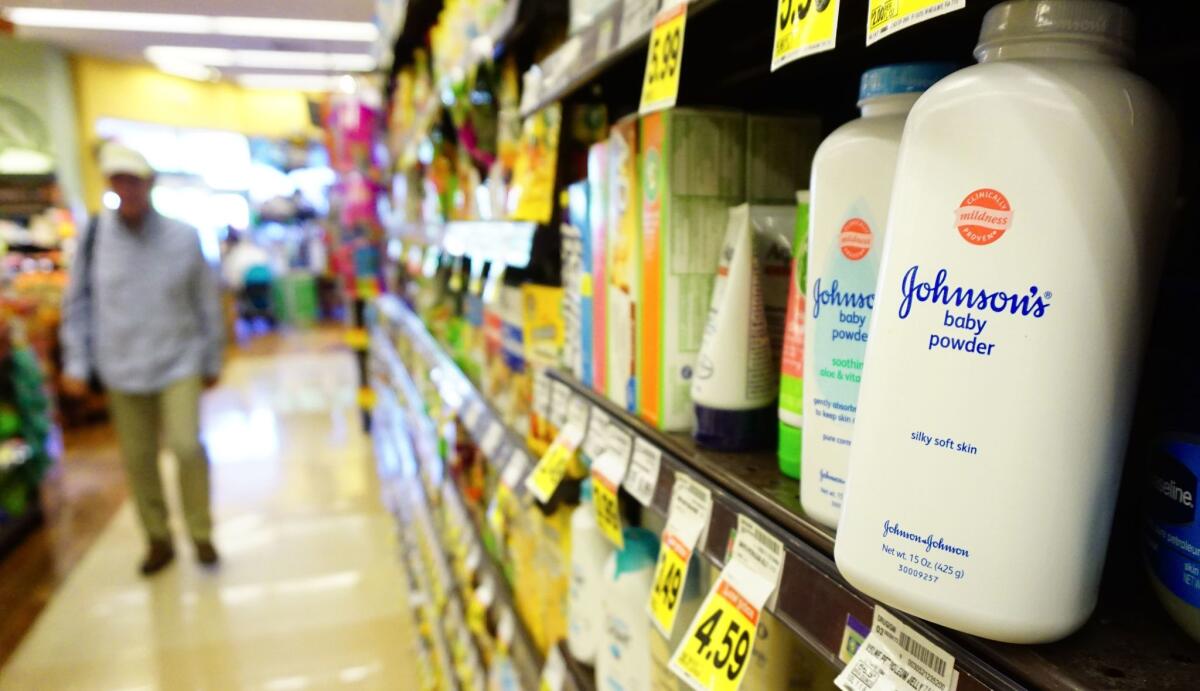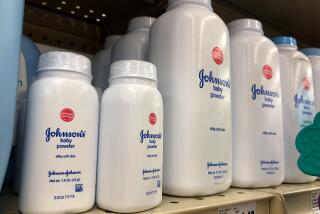J&J wins trial over retired teacher’s baby powder cancer claim

- Share via
Johnson & Johnson won the latest trial last week over claims its iconic baby powder can cause cancer, as a jury in Long Beach rejected a lawsuit brought by a 65-year-old retired teacher who claimed the product was contaminated with asbestos.
The J&J victory Friday came the week after the company settled three cases alleging baby powder caused a rare asbestos-connected cancer. Two, in Oklahoma and California, were settled during trial. The other, in New York, was settled less than two weeks before trial was set to begin.
Plaintiff Robert Blinkinsop was diagnosed in July 2017 with mesothelioma, a rare cancer of the lining of the lung generally caused by asbestos exposure. Blinkinsop used Johnson’s baby powder daily for personal hygiene from 1977 to 1994 and on his children from 1992 to 1996, his attorney, Mark Bratt, said at trial. He also used the company’s Shower to Shower talc product.
J&J is facing more than 13,000 lawsuits linking baby powder and Shower to Shower to ovarian cancer or mesothelioma. More than two dozen trials have been scheduled in U.S. courts in 2019.
“Today’s jury unanimously ruled that Johnson’s Baby Powder does not contain asbestos and was not the cause of the plaintiff’s disease,” Kim Montagnino, company spokeswoman, said in an emailed statement. “This conclusion is aligned to the decades of clinical evidence and scientific studies by medical experts around the world that support the safety of Johnson’s Baby Powder.’’
Blinkinsop’s attorney said he was shocked and disappointed by the verdict.
“Given the hundreds of positive historical tests from J&J showing asbestos in its talc containing baby powder, as well as J&J’s ongoing decision to use deceptive testing techniques that allow for false negative results — we have no doubt asbestos was, and currently still is in J&Js talc baby powder products,” Bratt said in a statement. “Asbestos in baby powder is a huge public health concern that is far bigger than just this case.”
The company’s record at trial has been mixed so far. The company lost a $29-million jury award in a California mesothelioma case March 13 and won a defense verdict in a New Jersey trial March 27, the same day it settled the three cases.
Several of the first trials resulted in plaintiffs’ verdicts, including one for $4.69 billion in St. Louis in 2018 to 22 women with ovarian cancer. But J&J has been able to win reversals of three of the first five jury awards.
The company has also won other defense verdicts in cases alleging links between baby powder and mesothelioma beyond the New Jersey trial.
Some of the verdicts include awards against J&J’s talc supplier, Imerys America, which filed for bankruptcy protection in February.
Lawyers for Blinkinsop and his wife, Karen, alleged that J&J knew for decades that its talc contained asbestos yet didn’t warn or protect customers. People at J&J “made some really poor decisions in the past,” which led to Blinkinsop’s exposure to asbestos, Bratt said. Talc and asbestos were found in Blinkinsop’s lung tissue, he said.
Blinkinsop testified at trial that his condition is terminal.
“It’s not curable,” he said. The doctors have “all said the same thing that if everything goes well, I might survive three years,” he told jurors. “Never any guarantee about the quality of life during that time.’’
The company’s attorney told jurors there is no asbestos in J&J talc products and its talc didn’t cause Blinkinsop’s illness.
“For over 40 years we have been working with the best scientists, the best universities and the best laboratories who have all confirmed our products do not contain asbestos,’’ defense attorney Bruce Hurley said.
Blinkinsop could have been exposed to asbestos while working on construction jobs, he said. “Mr. Blinkinsop’s mesothelioma was not caused by Johnson’s baby powder,’’ Hurley said. “Cosmetic talc does not cause mesothelioma.’’
More to Read
Inside the business of entertainment
The Wide Shot brings you news, analysis and insights on everything from streaming wars to production — and what it all means for the future.
You may occasionally receive promotional content from the Los Angeles Times.










